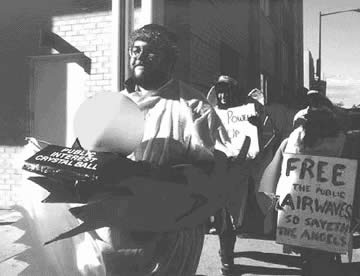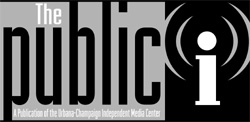Public
Interest Angels Descend on FCC
by John Tarleton, Washington
DC IMC
 "The
night after I was sworn in, I waited for a visit from
the angel of public interest. I waited all night, but
she did not come. I still have had no divine awakening
and no one has issued me my public interest crystal ball." "The
night after I was sworn in, I waited for a visit from
the angel of public interest. I waited all night, but
she did not come. I still have had no divine awakening
and no one has issued me my public interest crystal ball."
Michael Powell, FCC Chairman
Nikki
Larson helped start an eclectic 60-watt pirate radio
station in Knoxville, Tennessee last fall after her campus
station switched to an automated playlist and eliminated
local news coverage. On Friday afternoon, March 22, Larson,
20, joined a small but plucky band of public interest
ëangelsí who descended on the headquarters
of the Federal Communications Commission (FCC). Two weeks
previously, an FCC marshal and the local sheriff had ordered
her First Amendment Radio to cease programming from a
250-foot-high ridge overlooking Knoxville.
Singing anti-corporate hymns and wearing white sheets,
tinsel halos, and wings made of cardboard, Larson and
a dozen other angels were among an ad-hoc group of 60
media activists who gathered on a bitterly cold day to
call for a reversal of government policies that have left
the US media system in the hands of a small group of global
conglomerates.
Why angels? The protesters were responding to an earlier
statement by FCC Chairman Michael Powell, who remarked,
"The night after I was sworn in, I waited for the
angel of the public interest. I waited all night, but
she did not come." Powell has also been quoted as
saying, "The market is my religion."
When the angels tried to deliver a public interest crystal
ball to Powell at the FCC headquarters, they were rebuffed
at the building entrance by a phalanx of security guards.
"I didn't expect them to come out and say anything,"
Larson said. "But I donít know how long they
can ignore us. Speech is meant to be free. That's what
the First Amendment is all about."
Speakers at the event included Inja Coates of Media Tank,
Jeff Chester of the Center for Digital Democracy, Dee
Dee Halleck of Deep Dish TV, Richard Turner of the Alliance
for Community Media, Peter Hart of Fairness and Accuracy
in Reporting (FAIR), Reverend Billy of New York City's
Church of Stop Shopping, and Terry O'Neill of the National
Organization for Women. They warned that democracy was
being eroded by media concentration.
"Without a broad array of voices we cannot have the
kind of public discussion of public issues that we need
to have in order to maintain our democracy," O'Neill
said.
Dawn Zupelli, 32, a sign language interpreter from Rochester,
New York, echoed the speakers' sentiments. "I fear
if we don't speak up now, we'll never be heard. We're
already being pushed further and further to the margins."
Jim Land, a 27-year FCC employee, came down from his office
to watch the protest. Wearing baggy pants and a purple
tie-dyed T-shirt, he reminisced about being tear-gassed
during Vietnam-era protests at the University of Maryland.
He said the biggest impact of pending media mergers would
be an increase in advertising rates. He was confident,
however, that the public interest would still be served.
"In the future people are going to find their information
on the Internet"î Land said.
The FCC was established in 1934 to ensure that broadcasters
would serve the "public interest, convenience, or
necessity." As media ownership restrictions and public
service obligations have been eliminated in recent years,
critics have accused the FCC of abandoning its mission.
Just two days after the tragedies of September 11 last
year, while the rest of America was still trying to cope
with the shock and trauma of the attacks, the FCC decided
to "review" its own regulations on media cross-ownership.
And on February 19, a federal appeals court nullified
a pair of long-standing government regulations that had
previously limited the size of media giants like AOL/Time
Warner, Viacom, News Corp., and General Electric/NBC.
One of these rules prevented the same company from owning
TV stations and cable franchises in the same market. The
other rule limited the number of TV stations a single
company could own.
Jeff Chester warns that the Internet is the next target,
as cable providers look to monopolize high-speed broadband
services.
"The Internet is being hijacked by old media companies
in order to integrate it into their existing production
and distribution apparatuses," Chester said.
Stephanie Finneran, 17, of Asheville, North Carolina,
believes FCC policies represent an attack on the public
good. "It seems like another case where the community
and the people don't really matter, and that profit wins
out over what society really needs," she said.
FCC Chairman Michael Powell, the son of Secretary of State
Colin Powell, has become a lightning rod for media activists
since Bill Clinton appointed him to the commission in
1997. The National Association of Broadcasters (NAB),
on the other hand, has hailed him as an "outstanding
choice", and Powell in turn has referred to broadcast
corporations as "our clients", while denouncing
public interest regulations as "the oppressor".
"If Michael Powell was a city planner and he was
planning New York City, he would probably pave over Central
Park and put in another Times Square, or he would take
all the neighborhood bodegas and sell them all and turn
them into Burger Kings," said Pete Tridish of the
Philadelphia-based Prometheus Radio Project. "There
is no room in Michael Powell's future for either public
spaces or small businesses because it's just the law of
the big fish in the sea as far as he is concerned."
Powellís office was unavailable for comment.
Organizers envision the March 22 demonstration as the
kickoff of a multi-pronged campaign for media democracy
in the United States. ìThis event put the FCC on
notice that they are being watched, that people are doing
things, that they are willing to take to the street,î
Tridish said.
The angels who turned out on March 22 are looking to produce
downloadable teaching materials for activists around the
country. Plans are also underway for protests at NAB's
September 12-14 annual meeting in Seattle, and for Media
Democracy Day on October 18.
Tridish hopes media activists will want to launch a campaign
against Clear Channel, the radio conglomerate that has
purchased over 1,200 radio stations since the Telecommunications
Reform Act of 1996 was signed into law. "They make
a great target because they are everywhere," he says.
"And, they deserve it."
As for Larson, she and her friends have no plans to take
their tiny station off the air in Knoxville. "We're
going to keep broadcasting," she says, "because
everybody has a right to good radio."
For additional news coverage
of the FCC protests by local media democracy advocate
Amy Aidman, visit www.mediageek.org or www.ucimc.org.
|
|






